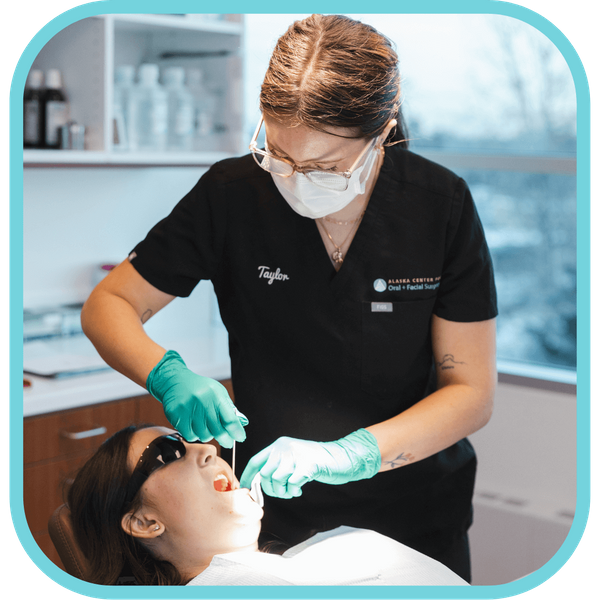Wisdom Teeth
Wisdom Tooth Surgery at Alaska Center for Oral + Facial Surgery
At the Alaska Center for Oral + Facial Surgery, we specialize in safe and effective wisdom tooth removal. As Alaska's only AAAHC accredited oral and maxillofacial surgery practice, our expert team, led by Dr. Nordstrom, utilizes advanced technology and techniques to minimize discomfort and promote quicker recovery times. We understand that concerns about cost and accessibility are top of mind for many patients. That’s why we offer affordable wisdom teeth removal options tailored to your needs. Whether it's a routine extraction or an emergency wisdom tooth removal, our compassionate team is dedicated to providing high-quality care in a friendly environment.


Why Choose Us for Your Wisdom Teeth Removal
Oral and maxillofacial surgeons have a minimum of four to six years of formal training beyond the four years of dental school. This training specifically involves the surgical removal of wisdom teeth. Oral and maxillofacial surgeons are the most proficient providers for the safe and effective removal of wisdom teeth, in addition to being the best at performing this type of oral surgery — and this specific specialty sets the national standard of care for this surgery. Dr. Nordstrom has six years of hospital-based surgical training beyond his four years of dental school, and has formal medical training. Moreover, he takes this surgery very seriously and puts patient safety as the number one priority.
As you grow and develop, your mouth adjusts to many changes — from getting your first teeth and losing them, to developing adult teeth, including your wisdom teeth.
Wisdom teeth are generally the last set of molars to appear, surfacing anywhere between 17 to 21 years of age. If all goes well they’ll grow in without any major issues and they’ll never cause an issue, but for a majority of people, they need to be removed.

Why do wisdom teeth need to be removed?
Wisdom teeth can cause problems when there isn’t enough space for them to grow into, causing crowding to your existing teeth which can result in crooked teeth.
Another reason for wisdom teeth removal is when they are impacted. An impaction simply means that your wisdom teeth have developed beneath your gums and have grown in a way where they are trapped and can’t properly surface.
Because every person is unique, wisdom teeth may also need to be removed as a result of the following:
- Infection
- Pain and discomfort
- Tumors
- Cysts
- Damage to surrounding teeth
- Tooth decay
- Gum disease

Understanding Wisdom Teeth and Their Removal
Wisdom teeth, the last molars to develop, can often pose significant challenges as they emerge. Most individuals will experience the eruption of their wisdom teeth in their late teens or early twenties. Unfortunately, not all wisdom teeth make their way out smoothly; many become impacted, a condition where the teeth are trapped beneath the gums or jawbone. This can lead to painful symptoms and affect the alignment of your existing teeth if left untreated.
When wisdom teeth become a pain!
If you suspect you’re developing your wisdom teeth, work with your dentist or oral surgeon to better monitor them. Below are some scenarios to watch for.
If your wisdom teeth develop in the wrong space, it may make space for food and bacteria to get trapped, making you more susceptible to tooth decay and cavities. It also makes it difficult to floss in-between your wisdom teeth and other molars when they grew in extremely close to each other.
When your wisdom teeth begin to surface and then don’t completely develop, it leaves you at greater risk for bacteria hang around the site and cause an infection. With a tooth infection, you’ll typically have pain, stiffness, and swelling in your jaw and at the site of the tooth.
Wisdom teeth that are both below the surface and those that have developed need to be monitored for potential risks. Connect with our oral surgeons to come up with an action plan for your wisdom teeth today!
Connect with us and learn more about our wisdom teeth surgical procedure today!
Recognizing the signs of potential issues with your wisdom teeth is crucial for maintaining your oral health. Symptoms such as pain, swelling, and difficulty opening your mouth may indicate infection or impaction. If you experience discomfort while brushing or flossing, it could signal that your wisdom teeth are causing crowding or decay in surrounding teeth. Don’t wait for complications to arise—schedule a timely evaluation with our experienced oral surgeons at the Alaska Center for Oral + Facial Surgery. Let us help you ensure a healthy smile; contact us today to set up your appointment!
